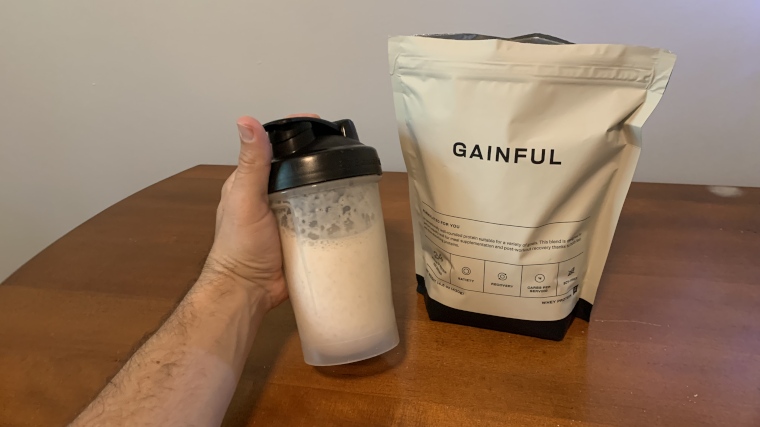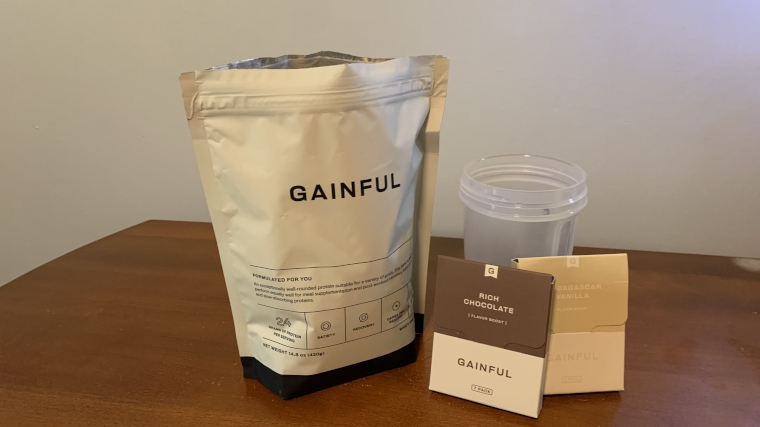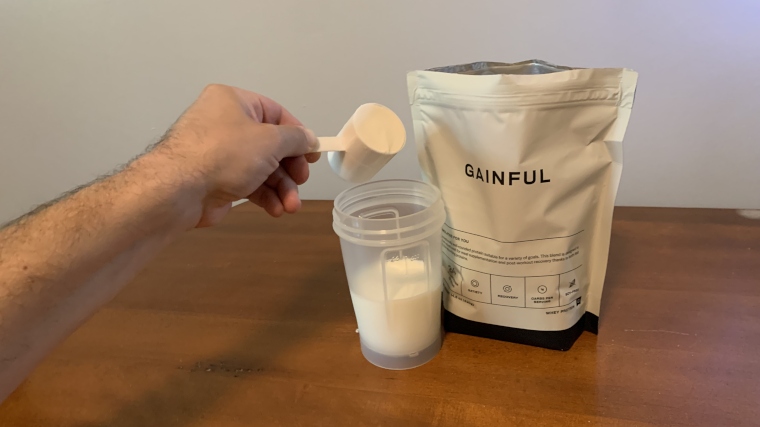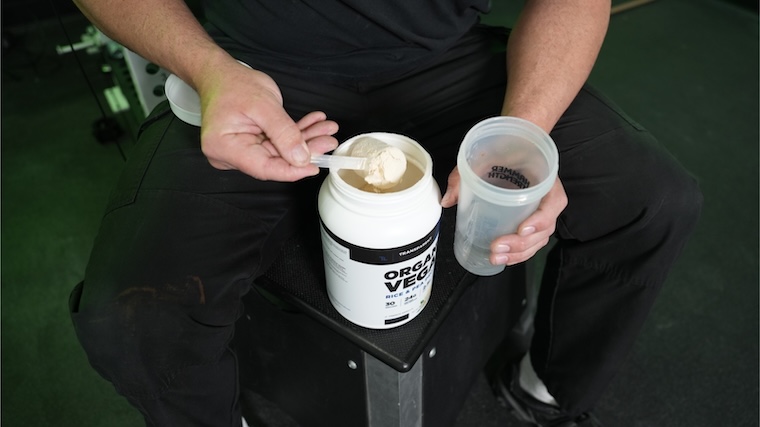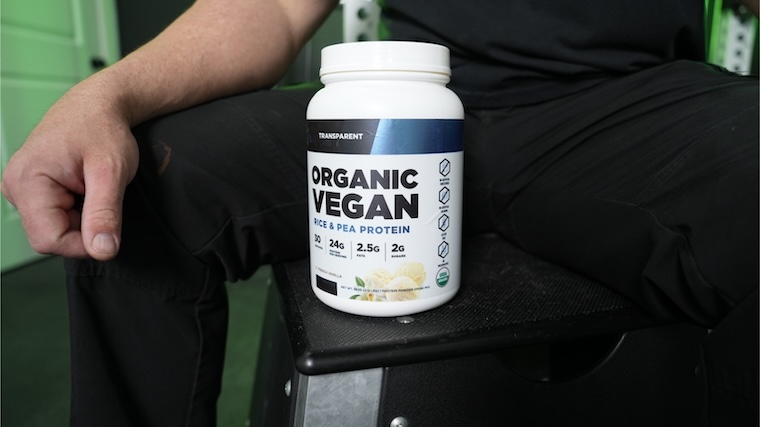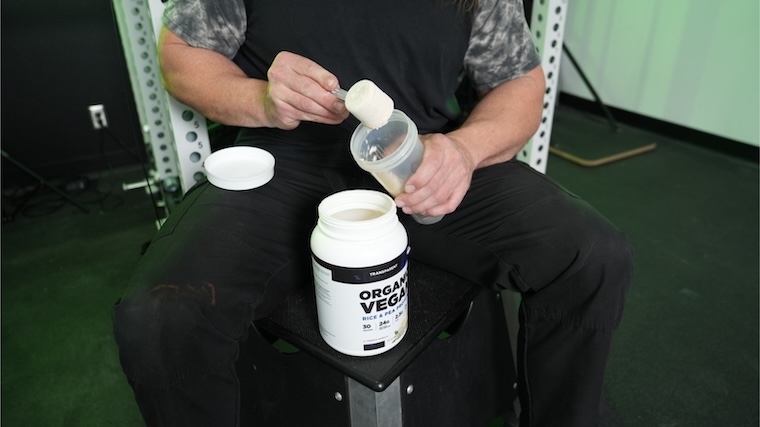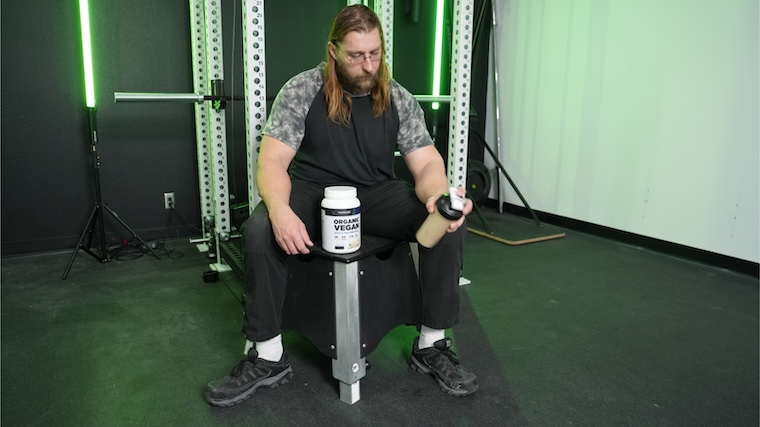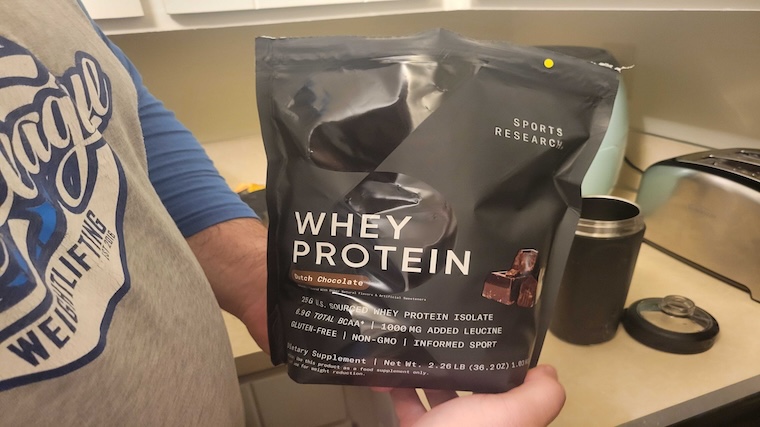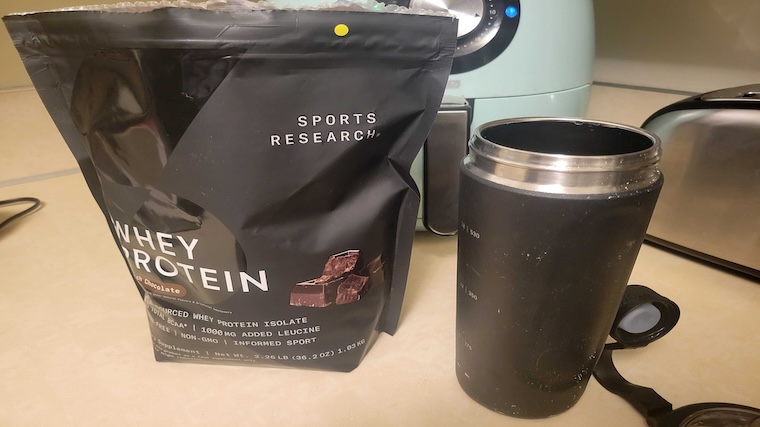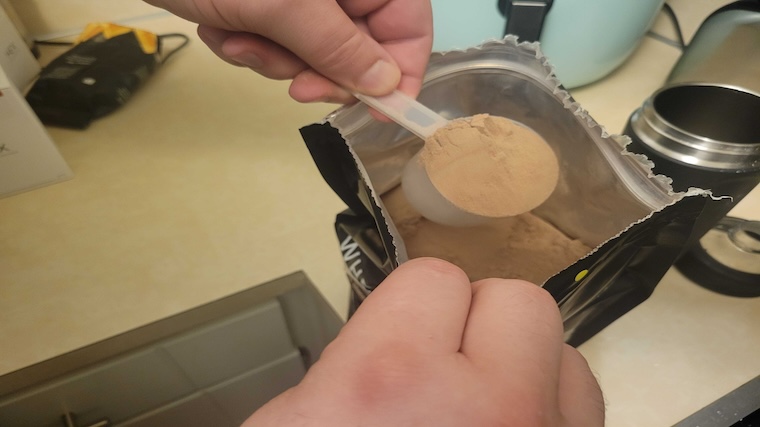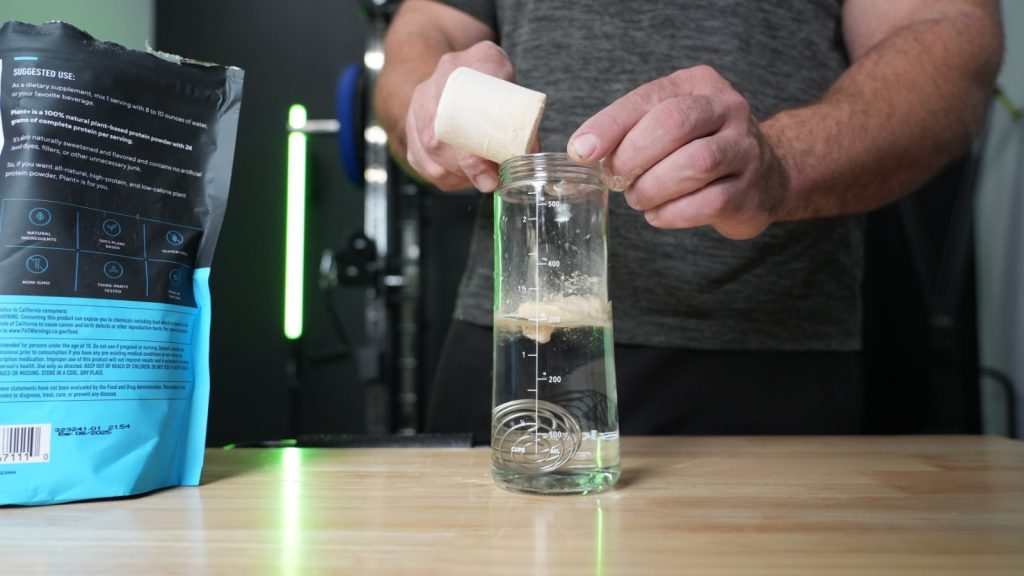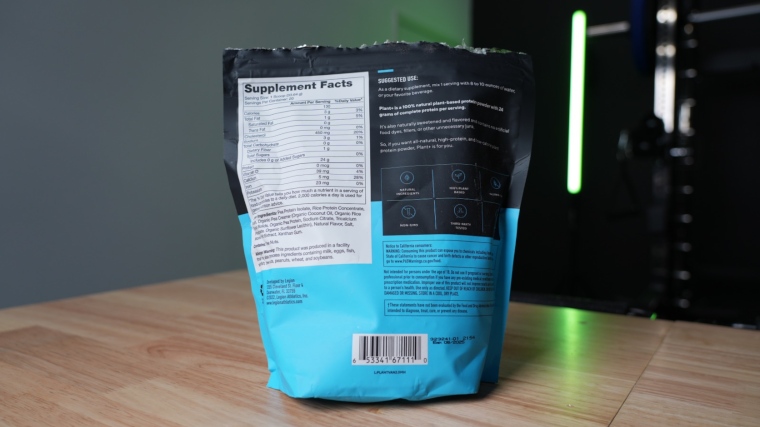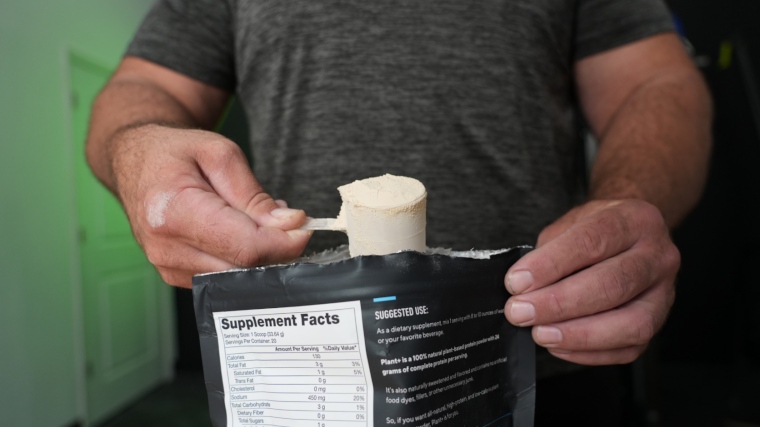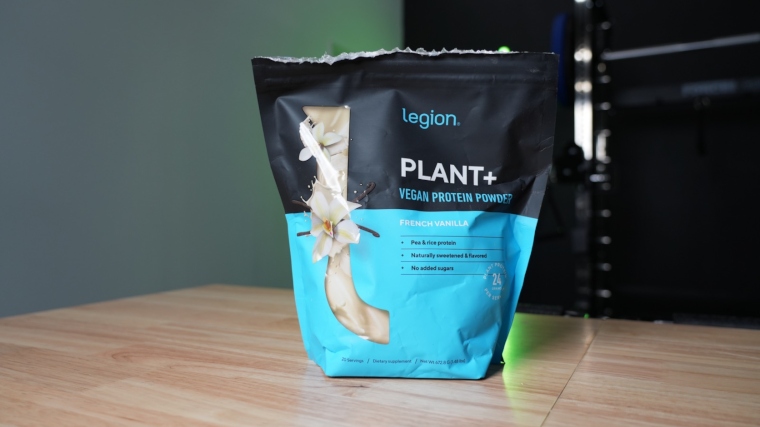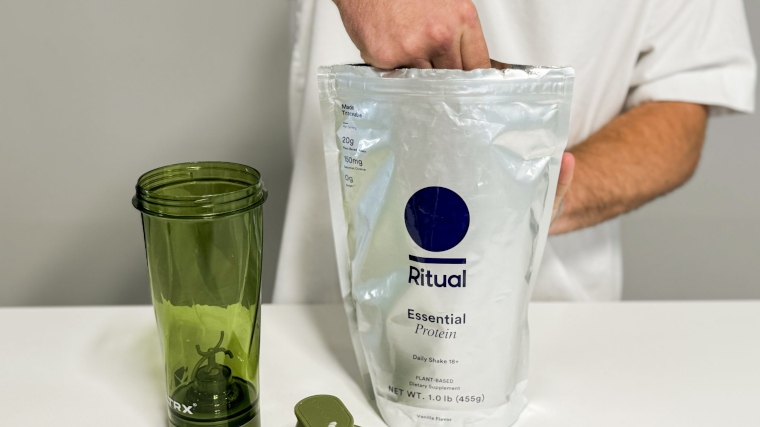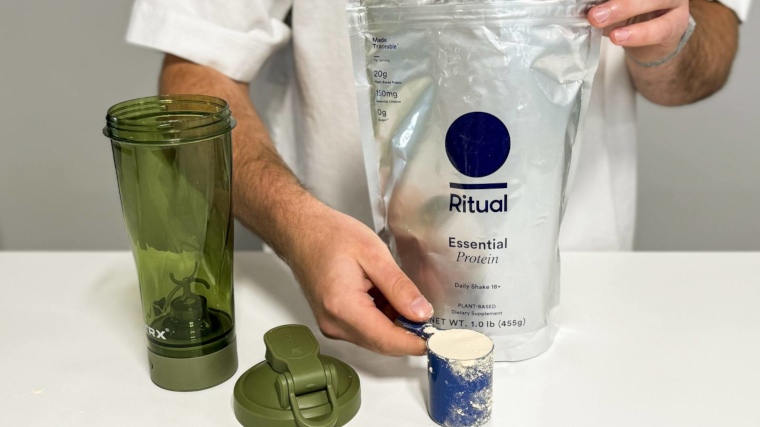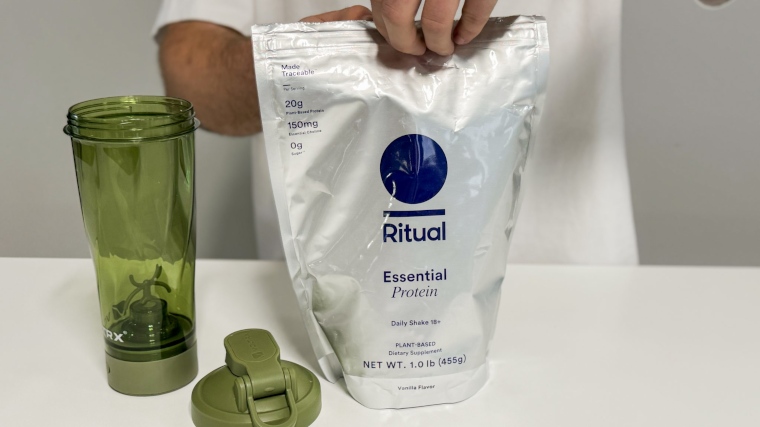Lactose intolerance can be a pain at times, especially when trying to optimize your protein intake to build muscle, lose body fat, manage your blood sugar, or strike a healthy balance between hunger and satiety throughout the day. While your lactose-tolerant friends can chug any post-workout shake they want, you’ve gotta be a little more careful when choosing a protein powder. Fortunately, you don’t have to miss out because of a sensitive tummy.
For anyone wanting all the best protein powder benefits without the digestive discomfort, we’ve got you covered. Our team of experts has personally tested dozens of supplements to find the best lactose-free protein powders for a variety of dietary preferences and fitness goals.
The 6 Best Lactose-Free Protein Powders of 2025
- Best Lactose-Free Protein Powder Overall: Gainful Plant Protein
- Best Pea Protein Powder: Transparent Labs Organic Vegan Protein
- Best Low-Lactose Whey Protein: Sports Research Whey Protein Isolate
- Best Tasting Lactose-Free Protein Powder: Legion Plant+
- Best Lactose-Free Protein Powder for Weight Loss: Ritual Essential Protein Daily Shake 18+
- Best Lactose-Free Protein Powder for Muscle Gain: 1st Phorm Vegan Power Pro
Editor’s note: The content on BarBend is meant to be informative in nature, but it should not be taken as medical advice. The opinions and articles on this site are not intended for use as diagnosis, prevention, and/or treatment of health problems. It’s always a good idea to talk to your doctor before beginning a new fitness, nutritional, and/or supplement routine. Individual needs for vitamins and minerals will vary.
How We Tested and Chose the Best Lactose-Free Protein Powders
The BarBend team is made up of competitive athletes, certified personal trainers, and lifelong fitness enthusiasts. To determine the best lactose-free protein powders, we’ve tested nearly 100 different supplements from some of the industry’s most trusted brands using a multi-point methodology to rate each profile on a scale of 1 (lowest) to 5 (highest). Below are some of the categories and components that played into our rankings.
For further information on how we trial and test the products chosen for this guide and more, be sure to read the BarBend supplement testing methodology page.
- Protein Dose: One of the most important things in a protein powder is the amount of protein you’re actually getting from it. After all, the whole purpose of taking protein powder is to significantly boost your protein intake. We looked for protein powders with at least 18 grams of protein per serving — the more the better.
- Protein Quality: Different types of protein powders can vary greatly in protein quality, depending on the protein food source and processing methods. We looked for complete proteins high in leucine, such as low-lactose whey protein isolate, soy protein, pea protein, or pea and brown rice protein blends. We also preferred higher-purity protein isolates over protein concentrates.
- Third-Party Testing: Dietary supplements aren’t strictly regulated in the US, so the supplement industry can be something of a Wild West. We prefer proteins tested by independent labs for quality, banned substances and heavy metals, and we like to see third-party certifications like USDA Organic or certified gluten-free.
- Ingredient Quality: While we stop short of using the vague term “clean”, we had a strong preference for formulations without artificial flavors, sweeteners, or colors. While safe in food, we know that many consumers prefer to avoid them. And with so many other alternatives available, they’re simply unnecessary.
- Value: Price is an important consideration, especially when taking multiple supplements a day. We like to see supplements under $2 a serving, but aren’t opposed to more expensive proteins if they provide a lot of value for the price.
Best Lactose-Free Protein Powder Overall: Gainful Plant Protein
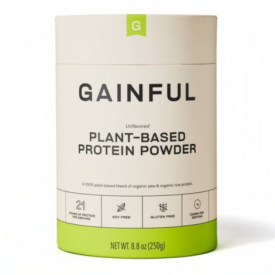
Gainful Plant-Based Protein Powder offers up to 24 grams of organic brown rice and pea protein, which delivers a complete amino acid profile. Right now, take 50% off your first order with the code: BF50.
Specs
- Price Per Serving: Starting at $3.21
- Protein Source: Organic pea and rice protein
- Protein Per Serving: 24g
- Calories Per Serving: 120
- Available Flavors: Unflavored, Strawberry Milkshake, Cookies & Cream, Caffe Mocha, Peanut Butter Cup, Chocolate Fudge, French Vanilla
- Third-Party Testing: No
Not only is Gainful Plant Protein one of the best clean protein powders, it also made our top choice for the best overall lactose-free protein powder. With an impressive 24 grams of complete plant protein, a variety of flavor options, lean formulation, and unlimited access to a registered dietitian as part of your subscription, this protein offers a ton of value for the price.
To try it, you’ll need to sign up for a subscription and complete a quick survey on your health and training goals. The results are used to create a supplementation regimen personalized for your needs.
Our product tester, a certified personal trainer, loved how the innovative flavor packs prevent flavor fatigue. “I enjoyed how you can fine-tune your tastes from day to day with the included flavor packs. Each shake can be its own unique flavor since the base powder is Unflavored. I preferred the Chocolate and Vanilla, but there are others — like Sea Salt Caramel — that I’m really looking forward to.” they said, rating the flavor a 5 out of 5.
Unfortunately, this protein does tend to clump when using a shaker bottle, earning it a 3 out of 5 for solubility. Per our tester, “I tried blending this with a regular shaker bottle to no avail, so my recommendation is to use a countertop blender if you’re looking for a smooth, consistent texture.”
Chelsea Rae Bourgeois, one of our registered dietitian experts, rated the formulation a solid 4.5 out of 5. “I really like that Gainful offers a personalized protein powder formula, and I like that it’s unsweetened and free from artificial ingredients,” she noted. It’s also made from a balanced blend of pea and rice protein.
The main drawback of this protein is the price. While you do get extra value from the personalized supplementation regimen and registered dietitian access, I’d expect a protein this expensive to be USDA Organic certified and third-party tested, which Gainful isn’t.
Bourgeois sums it up like this: “While I think Gainful is on to something here, there may be comparable, more cost-effective options out there.”
Read our full Gainful Protein Powder Review.
Best Pea Protein Powder: Transparent Labs Organic Vegan Protein
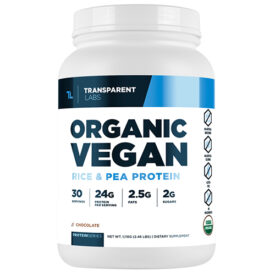
A surprisingly delicious vegan protein powder that's totally free from artificial ingredients and soy, Transparent Labs Organic Vegan Protein contains a 2:1 ratio of rice to pea protein powder, and four grams of fiber.
Specs
- Price Per Serving: Starting at $1.50
- Protein Source: Organic rice protein concentrate, Organic pea protein isolate
- Protein Per Serving: 24g
- Calories Per Serving: 140
- Available Flavors: Chocolate, French Vanilla
- Third-Party Testing: Yes (Informed Protein)
When determining the best pea protein powder, Transparent Labs Organic Vegan Protein was an easy choice. It has almost everything you’d want from a pea protein: 24 grams of protein verified by Informed Protein, a simple ingredients list, an affordable price point, and an organic certification. In fact, we were so impressed that it also made our pick for the best vegan protein powder overall.
Chelsea Rae Bourgeois, MS, RDN, LD, rated the formulation a 4 out of 5. “I love that Transparent Labs keeps the ingredients list short with their Organic Vegan protein powder. You get 24 grams of high-quality, plant-based protein without any unnecessary fluff. Plus, you get 30% of your daily iron needs,” she raved.
That said, it’s a bit high in sodium. According to Bourgeois, it “contains 260-300 mg of sodium per scoop, which isn’t a crazy amount, but it does account for around 15% of the recommended daily sodium intake,” so it may not be the best option for those on sodium restrictions.
In addition, it should be noted that this blend contains double the amount of rice protein than pea protein. This means it’s probably much lower in leucine, a branched-chain amino acid (BCAA) necessary for muscle-building.
The flavor isn’t bad, with our product tester, a certified personal trainer, rating it a 3 out of 5. “This wasn’t too bad for a vegan protein powder. I liked the dark chocolate notes that were a nice reprieve from the milk chocolate I’ve come to associate with protein powders. There is a bit of an earthy taste due to the rice and pea protein, though,” they said, adding that it wasn’t overpoweringly sweet.
Flavors are limited, but it’s a great option if you love keeping it classic with chocolate and vanilla. It blended well, although the consistency could be improved. “I will note that the texture is different than other proteins I’ve tried. It’s not necessarily gritty, but there is more film in the shaker. I can also feel this in my mouth during sips, too,” our tester said, rating the solubility a 4 out of 5.
Read our full Transparent Labs Organic Vegan Protein Review.
Best Low-Lactose Whey Protein: Sports Research Whey Protein Isolate
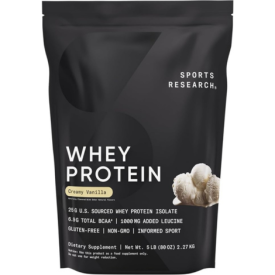
Offering 25 grams pf whey protein isolate alongside nearly 7 grams of BCAAs, Sports Research Whey Protein Isolate is a great option for those looking to supplement their diets, build muscle, and enhance workout recovery.
Specs
- Price Per Serving: Starting at $1.31
- Protein Source: Whey protein isolate
- Protein Per Serving: 25g
- Calories Per Serving: 140-150g
- Available Flavors: Chocolate, Creamy Vanilla, Dutch Chocolate
- Third-Party Testing: Yes (Informed Sport)
One of the benefits of choosing one of the best whey isolates over a whey protein concentrate is that isolates undergo extra processing to remove more carbohydrates and are lower in lactose as a result. With its impressive formulation and delicious flavors, Sports Research Whey Protein Isolate is an excellent low-lactose whey protein.
The formulation received 4.5 out of 5 stars from Chelsea Rae Bourgeois, our registered dietitian. “Sports Research Whey Protein Isolate is an impressive protein powder. It packs in the protein, including a hefty dose of BCAAs to support muscle recovery and growth. If you’re looking to increase your protein intake without skewing your other macros, this could be a great option,” she said.
It also offers 100% of your vitamin D needs and supplemental leucine to boot, in addition to being third-party tested for banned substances. Unfortunately, it does contain two artificial sweeteners.
Besides its effective nutrient profile, this protein got top marks (5 out of 5) for taste. Our product tester, a former Olympian, had this to say about the Creamy Vanilla and Dutch Chocolate flavors: “I mixed them with water and found the tastes to be enjoyable. I also sampled the Creamy Vanilla with milk and thought this mixture really brought out the creaminess and flavor profile of the protein. This variety, in my opinion, would be excellent for smoothies.”
It also blended smoothly, thanks in part to the MCT powder and sunflower lecithin. “There weren’t any clumps or residue, and the texture was smooth and consistent. You can easily mix this with a shaker bottle and have no qualms about the consistency,” our tester noted, rating the solubility a 5 out of 5.
And yet again, this protein received a 5 out of 5 rating for the lack of negative side effects reported by our product tester.
As for disadvantages? Disappointingly, it isn’t made with grass-fed whey protein. And according to Bourgeois, “If you’re prone to flavor fatigue, you might get bored… It’s only available in two flavors: Creamy Vanilla and Dutch Chocolate.”
Best Tasting Lactose-Free Protein Powder: Legion Plant+
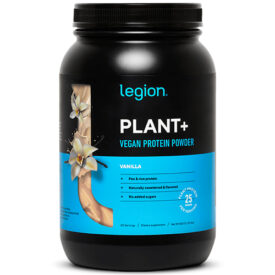
Legion's Plant+ has 25 grams of protein per serving, just four grams of carbs, and is packed with vitamins and minerals that plant-based eaters may want more of. Use code "BARBEND" for 20% off!
Specs
- Price Per Serving: Starting at $2.02
- Protein Source: Pea protein isolate, Rice protein concentrate
- Protein Per Serving: 24-25g
- Calories Per Serving: 130-140
- Available Flavors: Chocolate, Vanilla, Apple Pie, Cinnamon Cereal, Mocha Cappuccino, Salted Caramel
- Third-Party Testing: Yes (ISO 17025 Accredited Lab)
If you’ve experimented with protein powders before, you’re no stranger to the artificial aftertastes, chalkiness, or simply off-putting flavors of some proteins. Fortunately, Legion Plant+ is both lactose-free and delicious with 6 tasty flavors, such as Apple Pie, Cinnamon Cereal, and Mocha Cappuccino.
Our tester rated the Cinnamon Cereal flavor a 4 out of 5. “Flavor-wise, this tasted like cereal milk. It’s definitely sweet but not too overpowering. However, there is a somewhat chalky taste which I feel is sort of unavoidable with plant-based proteins,” they said.
It mixed up smoothly with no grittiness, receiving a 4 out of 5 rating for solubility. “I had to mix this in a cup with a spoon, but the powder surprisingly blended with ease… I had some clumps, but I feel those were the result of my mixing protocol rather than the powder itself. With a shaker bottle, you should have no issues,” they reported. “I’d say the thickness is medium, comparing it to a viscous chocolate milk.”
As for the formulation, Chelsea Rae Bourgeois, MS, RDN, LD was a fan. “I really like Legion Plant+ as a vegan protein powder. You get 24-25 grams of protein per scoop, all from high-quality, plant-based sources. Plus, there’s no added sugar, and the fat and carb content are controlled,” she noted.
Overall, she gave it 3.75 out of 5 stars, with deductions for the high sodium content — as high as 600 milligrams in some flavors — and the “limited vitamin and mineral profile.” Depending on the flavor, you may or may not get any iron, and it contains significantly less calcium than many other plant-based proteins.
Considering most plant proteins contain about 20 grams of protein, this is one of the best protein powder options for those wanting the highest possible protein content. It’s also nice to see the use of monk fruit and stevia rather than artificial sweeteners or sugar alcohols.
Our product tester summarized their experience like this: “In the future, I’ll likely use this protein powder again, although I feel the sweet flavors may be too overpowering for daily use.”
Best Lactose-Free Protein Powder for Weight Loss: Ritual Essential Protein Daily Shake 18+
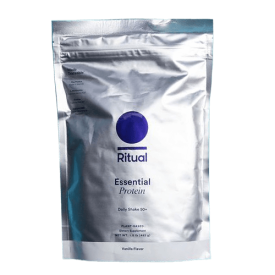
This clean, transparent protein powder relies on organic, non-GMO yellow peas for its 20-gram protein dosage. Additionally, the subscription-based model helps ensure you’re always stocked up to help you meet your nutritional goals day in and day out.
Specs
- Price Per Serving: $2.67
- Protein Source: Organic pea protein
- Protein Per Serving: 20g
- Calories Per Serving: 115
- Available Flavors: Vanilla
- Third-Party Testing: Yes (Clean Label Project Certified)
Since many protein powders contain oil-based “creamer” blends or added sugars, the search for a great-tasting, smooth protein that’s also really lean can seem impossible. Fortunately for those trying to lose weight, Ritual Essential Protein Daily Shake is here with 20 grams of protein, minimal carbs and fat, and only 115 calories per serving. And because it’s 100% vegan, there’s no lactose in sight.
Ritual wins major Brownie points for their transparent labels. Chelsea Rae Bourgeois, a registered dietitian, agreed: “I’m a huge fan of companies that are transparent with their formulas, and Ritual’s got that down to a science. Essential Protein Daily Shake is third-party tested and made with traceable ingredients, so you know exactly what you’re putting in your body and where it came from.” In fact, we were so impressed that it also made our list of the best organic protein powders.
The formulation itself is top-tier, earning a 4.5 out of 5 from Bourgois. “I like the formula’s macro ratio, but I especially like that Ritual added L-methionine to make it a complete protein,” she noted. Pea protein is slightly low in methionine, so the added L-methionine helps balance the amino acid profile.
Of note, it did receive a half-point deduction for the sodium content. Said Bourgois, “While it’s not an outrageous amount, each serving of Essential Protein provides 290 mg of sodium — something to keep in mind if you’re watching your sodium intake.”
Despite being low-carb, the flavor and consistency were spot on. “This protein was enjoyably creamy with no strange aftertaste… I’d recommend blending with a shaker bottle, though. I mixed with a simple spoon a handful of times and found that the powder clumped up more often than not,” our product tester said, rating it a 5 out of 5 for both taste and solubility.
They did note a slightly gritty feeling at the back of their throat when swallowing but found that it went away after a couple minutes. Worth noting, this protein is fairly expensive at almost $3 a serving. If you have the budget, though, this is an excellent lactose-free option for weight loss.
Best Lactose-Free Protein Powder for Muscle Gain: 1st Phorm Vegan Power Pro
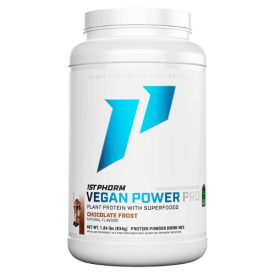
This plant-based protein powder utilizes high-quality pea and rice protein across its formulation to pair its hearty macronutrient counts to a full amino acid profile. Plus, 1st Phorm includes a digestive enzyme blend and green superfood complex to further the potential health benefits experienced with this supplement.
Specs
- Price Per Serving: $1.83
- Protein Source: Pea protein, Organic rice protein
- Protein Per Serving: 19g
- Calories Per Serving: 110
- Available Flavors: Chocolate Frost, Chocolate Mint Cookie, Iced Oatmeal Cookie, Vanilla Creme
- Third-Party Testing: Yes (Informed Choice)
1st Phorm Vegan Power Pro is formulated with pea and rice protein, a complete blend containing optimal amounts of all nine essential amino acids to optimize your gains in the gym.
According to our product tester, the flavor is on point. “Taste-wise, I really enjoyed the Oatmeal Cookie variety. It smells like gingerbread and gives every sip that ‘Christmas morning’ vibe. There’s a hint of chalkiness with this powder, but I’ve come to expect that with plant-based proteins,” they said.
It makes for a very thick shake, which our tester enjoyed. “This protein was definitely thicker than other powders I’ve had in the past, but in a good way. The creaminess complements the Oatmeal Cookie flavor perfectly, and I didn’t have any clumps or grittiness with this powder. The mixture did stick somewhat to the sides of my shaker bottle, but with a shake this thick, I wasn’t too surprised,” they said, recommending a bit more water to thin it out.
It’s so thick, however, that it may cause some slight GI distress in some people. “I did feel slightly bloated after drinking this and feel this may be too thick of a protein for daily use,” our tester reported.
Overall, I gave the formulation a 4 out of 5 rating. I love the balanced amino acid profile, low sodium content, and lack of artificial ingredients or added sugars, but I prefer seeing at least 20 grams of protein in a protein powder.
In addition, while some feel that the best time to drink a protein shake is immediately after a workout, it may be best to wait a few hours before drinking 1st Phorm. Free radicals are an important signal for the body to begin repairing damaged muscle tissue, so high levels of antioxidants could actually interfere with muscle recovery if taken too soon after a workout. (1)
It’s also high in polyphenols, which are great for gut health but may lead to bloating if you aren’t used to eating many plant-based foods. The good news is that your gut should adjust after a short time.
Benefits of Lactose-Free Protein Powders
Many dietary supplement brands, especially in the fitness world, are notorious for trying to convince you that their (often ineffective) formulations are just what you need to start seeing results. Fortunately, most lactose-free protein powders are an exception. They offer many health benefits, such as:
- Less gastrointestinal discomfort: The stomach pain, bloating, gas, and diarrhea that can accompany lactose ingestion in people with lactose intolerance can be downright miserable. Fortunately, there are plenty of lactose-free or low-lactose whey protein powders to help prevent these symptoms.
- Help build muscle mass: One of the most popular reasons for using protein powder is to put on muscle, and it’s certainly effective for this purpose. Most protein powders contain at least 20 grams of protein, which fits with the International Society of Sports Nutrition’s recommendation to get between 20 to 40 grams of protein with every meal, protein shake, or protein bar throughout the day to optimize muscle growth. (2) If this is a benefit you’re interested in, check out the best protein powders for muscle gain.
- Help preserve muscle during weight loss: When in a calorie deficit, the body burns both fat and muscle to make up for the energy it isn’t getting from food. A major benefit of eating a high-protein diet during weight loss is that it can prevent the body from burning as much lean mass, preserving the muscle you have and helping you maintain a healthy body composition and metabolic rate. (2)
- Can make meals more balanced: If you’ve ever felt hungry again just an hour after drinking a fruit smoothie or eating a plain bowl of oatmeal, you aren’t alone. When eating these foods as a meal, it’s important to include good sources of fat and protein to make them more nutritionally balanced and satisfying. Protein powder is an easy way to add a big dose of protein to these types of foods.
How Much Do Lactose-Free Protein Powders Cost?
In our search, we found that the price of lactose-free protein powders varies quite a bit based on the protein source, specialty ingredients, third-party certifications, subscription services with added value, and branding. Most fall within a range of about $1 to $3 per serving. Unflavored bulk protein powders may cost less, while we found one product with access to a registered dietitian priced over $3 a serving.
| Best Lactose-Free Protein Powder Overall | Gainful Plant Protein | Starting at $3.21 |
| Best Pea Protein Powder | Transparent Labs Organic Vegan Protein | Starting at $1.50 |
| Best Low-Lactose Whey Protein | Sports Research Whey Protein Isolate | Starting at $1.31 |
| Best Tasting Lactose-Free Protein Powder | Legion Plant+ | Starting at $2.02 |
| Best Lactose-Free Protein Powder for Weight Loss | Ritual Essential Protein Daily Shake 18+ | $2.67 |
| Best Lactose-Free Protein Powder for Muscle Gain | 1st Phorm Vegan Power Pro | $1.83 |
What to Consider Before Buying Lactose-Free Protein Powder
It might be okay to impulse-buy clothing or iced coffees, but we wouldn’t recommend doing this with protein powders. There’s a lot to consider when choosing the product that’ll best meet your needs.
Your Budget
To stay consistent with protein supplementation, finding a protein powder that fits your budget is essential. Lactose-free protein powders vary significantly in price based on a number of factors, such as:
- Third-party certifications
- Branding
- Specialty ingredients
- Ingredient quality
- Subscription orders vs. one-time purchases
- Additional included services from the brand
Fortunately, with such a wide range in prices, you’re likely to find one that fits your budget.
Dietary Preferences
It’s important to remember that lactose-free and low-lactose protein powders may not fit with every dietary preference. For example, vegans choose to avoid products made from whey, casein protein, cow’s milk protein, bone broth protein, beef protein, collagen, and egg white protein. People who prefer to avoid all added sugars, want a USDA-certified organic product, or want to avoid artificial ingredients will need to check product labels carefully.
Your Fitness Goals
If you have certain fitness goals you want to crush, you’ll want to choose a protein powder formulated specifically for those needs. If you want to build muscle, it’s best to choose a protein high in leucine, such as low-lactose whey protein isolate powder. Soy and pea are the best plant-based protein powders as they have much more leucine than hemp protein does, for example.
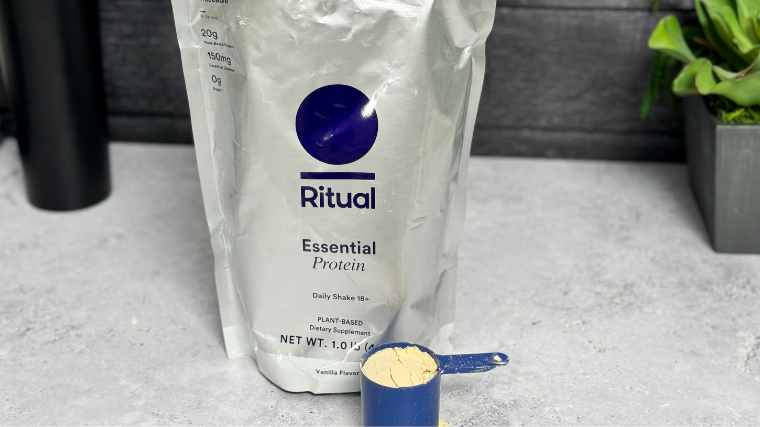
Similarly, choosing a protein with fewer carbs, fat, and total calories will best support weight loss.
Flavors
When taking protein powder every day or multiple times a day, flavor fatigue can be a real barrier to consistently meeting your protein goals. Ordering from a brand that offers multiple unique flavors in addition to the classic vanilla and chocolate can help prevent boredom while streamlining the ordering process.
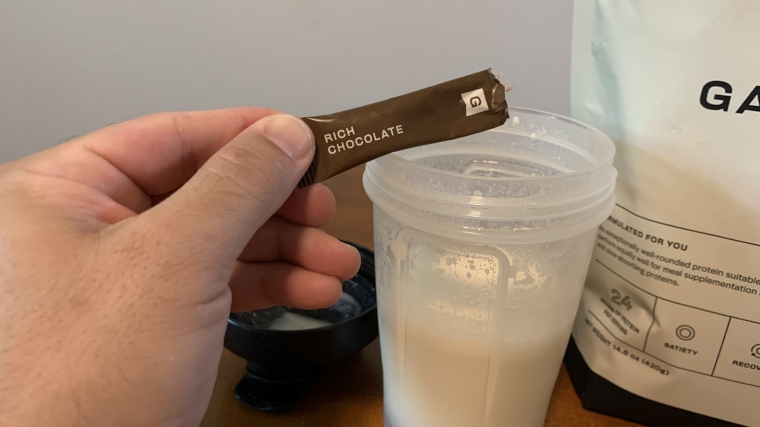
Be aware that the nutrition profile will sometimes vary based on the flavor, so be sure to check the nutrition facts label for each product before adding them to your cart.
Digestive Sensitivities
Certain ingredients frequently used in protein powders may cause digestive upset in sensitive people. Stevia and monk fruit, two natural non-caloric sweeteners, are examples. Some people with Irritable Bowel Syndrome (IBS) may be sensitive to certain gums as well. If you have sensitivities, be sure to look for the best protein powders for sensitive stomachs.
Allergens
This goes without saying, but you’ll want to carefully avoid protein powders with ingredients that you’re allergic to. Luckily, plenty of lactose-free proteins are also soy-free, milk-free, egg-free, wheat-free, and nut-free.
Lactose-Free Protein Powders FAQs
What is the best lactose-free protein powder?
Our fitness and nutrition experts rated Gainful Plant Protein as the best overall lactose-free protein powder. It’s pricey for a protein powder but packs 24 grams of complete protein from a blend of peas and rice. The innovative use of flavor packs prevents boredom, and you get a ton of value with unlimited access to a registered dietitian to reassess your protein needs throughout your fitness journey.
Is lactose-free the same as dairy free?
“Lactose-free” is not the same as “dairy-free”. Dairy-free and” non-dairy” products never contain lactose, but lactose-free products may be produced from dairy. If you follow a dairy-free diet, check out our picks for the best dairy-free protein powders.
How much do lactose-free protein powders cost?
Lactose-free protein powders range from about $0.75 per serving for bare-bones formulations to over $3 per serving for specialized products. Prices vary based on the presence of third-party certifications, specialty ingredients like creamer bases or antioxidant blends, and subscription vs. one-time purchases. Some brands offer additional services like access to a dietitian, which are reflected by higher prices.
References
- Taherkhani S, Valaei K, Arazi H, Suzuki K. An Overview of Physical Exercise and Antioxidant Supplementation Influences on Skeletal Muscle Oxidative Stress. Antioxidants. 2021; 10(10):1528. https://doi.org/10.3390/antiox10101528 https://www.mdpi.com/2076-3921/10/10/1528
- Jäger R, Kerksick CM, Campbell BI, et al. International Society of Sports Nutrition Position Stand: protein and exercise. J Int Soc Sports Nutr. 2017;14:20. Published 2017 Jun 20. doi:10.1186/s12970-017-0177-8. https://pubmed.ncbi.nlm.nih.gov/28642676/
